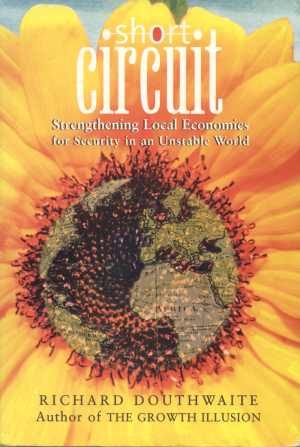Short circuit: Douthwaite's handbook of guerilla relocalization
David Delaney, Ottawa, June 2005
 Richard Douthwaite, Short circuit: strengthening local economies for security in an unstable world, 1996, The Lilliput Press, Dublin, 386 p.
Richard Douthwaite, Short circuit: strengthening local economies for security in an unstable world, 1996, The Lilliput Press, Dublin, 386 p.
This book deserves much wider readership. Its very informative table of
contents is reproduced below. The book is a must-read for those who see
that their communities are being devastated by "free" markets, and are
looking for ways to buffer their communities from destructive
competition. It's also for those who believe that we're all in for very
tough times in the near future, and are looking for ideas on how to
prepare communities for the coming storm.
The whole book is available on the web at http://www.feasta.org/documents/shortcircuit/.
The extremely useful table of contents is not so easily readable there
as it is below. The web version of the book has the substantial
advantages of having been kept up to date and having several additional
recent case studies. It's not a short book. I recommend the print
version for reading and the web version for reference. The web site version has a
convenient search function for the text of the book: http://www.feasta.org/documents/shortcircuit/searchform.html
Sources for the print version of Short Circuit:
http://www.booksteps.ie/bks/showbk2.php?bookid=261
http://www.amazon.co.uk/exec/obidos/ASIN/1870098641/qid=1118105613/
http://www.eco.com.au/ecobookshop/prod288.htm
From the author's preface:
"One of the things I learned from writing The Growth Illusion was that
policies designed to accelerate economic growth had concentrated so
much wealth and power in the hands of multinational companies and
financial institutions that national governments had left themselves
inadequate powers to safeguard citizens' interests. What could be done
to dilute this concentration? I asked myself. Power once gained is
rarely given up voluntarily, and governments had become too weak to
take it back for themselves even if they were inclined to do so, which,
generally, they were not. Intrigued, I thought I might write a book on
the topic ...."
Contents
FOREWORD by Ed Maya and Helena
Narberg-Hadge
vii
PREFACE
xi
INTRODUCTION
1 OUT OF
CONTROL
13
The world economy has become much more unstable since the early 1970s and
increasing numbers of people and places are excluded from full participation in
it. Unfortunately, national politicians are powerless to change the factors that
created this situation. Communities are going to have to act for themselves.
2 CREATING ENOUGH ELBOW
ROOM
31
To protect themselves from the instabilities of the world system, communities
can create parallel financial micro-climates within which local resources are
used to meet local needs to a much greater extent than would be possible if
only world.market prices and Interest rates ruled.
3 CUTTING THE MONETARY TIE
61
If people cannot trade among themselves without using money issued by out-
siders, their local economies will always be at the mercy of events elsewhere.
Many ways exist for them to create their own money, however. Options run from
group currencies such as LETS, through Swiss-style mutual credit systems for
businesses and commodity-backed currencies, as in Exeter, New Hampshire, to
money issued by local government, like that in Guernsey.
4 BANKING ON
OURSELVES
121
Locally owned financiai systems enable people's savings to be lent out in the
areas in which they live on terms that allow them to realize their social objec-
tives as well as their financial ones. Here again, communities have a wide range
of options open to them, including credit unions, building societies and invest-
ment trusts. Interest.free lending along the lines of the Danish and Swedish
community JAK banks is another possibility.
5 ENERGY MAKES THE WORLD GO
ROUND
179
The provision of an adequate supply of energy from local resources is funda.
mental to greater community self-reliance. Fortunately, most places can easily
develop a combination of wind, hydro and biomass sources to meet their
needs, as examples from Denmark, Austria and Ireland show. Saving energy is
as important as generating it, and here Holland and California provide good
models.
6 LIFE FROM THE
LAND
251
Modern industrial agriculture cannot be continued much longer because of the
damage it is doing to the soil and to its own genetic base. It also requires high
levels of energy-intensive jnputs from outside the local area. Organic and other
low-external.input types of agriculture are therefore needed if communities are
to become more self-reliant, and several techniques already in use in Britain,
the US and Ireland demonstrate that the transition is possible.
7 NEW ATTITUDES FOR NEW TIMES
332
The market economy relies on competition to control the way businesses
behave. As high levels of competition are not possible in a community economy,
new approaches and attitudes towards how we should interact commercially
need to be found. Medieval craft guilds, the Mondragon co-ops in Spain and the
Briarpatch network in California all provide hints about the right direction.
EPILOGUE: THE FUTURE, AND IT
WORKS
365
Maleny, a small town in Australia, has probably adopted more of the techniques
discussed in this book than any other place in the world. The result is a com.
munity where people can extend and fulfil themselves by working with each
other. But it is by no means self.reliant, so there is still a long way to go.
ADDITIONAL SOURCES OF
INFORMATION
372
ACKNOWLEDGMENTS
375
INDEX
377
David Delaney Home
 Richard Douthwaite, Short circuit: strengthening local economies for security in an unstable world, 1996, The Lilliput Press, Dublin, 386 p.
Richard Douthwaite, Short circuit: strengthening local economies for security in an unstable world, 1996, The Lilliput Press, Dublin, 386 p.